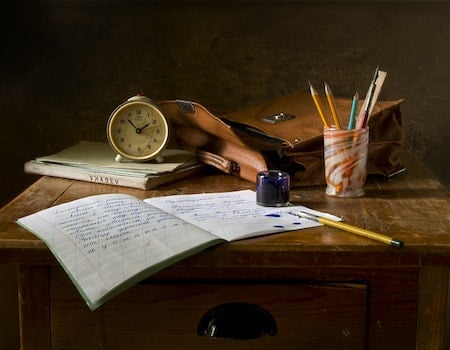Italian Grammar: A Lesson on Definite and Indefinite Articles
Expressive and musical, it’s no wonder Italian is often considered one of the most beautiful languages in the world. However, it can also be quite tricky for English speakers to get their heads around, especially when it comes to Italian grammar. With multiple verb tenses and unpredictable gender rules, it can seem like a challenge to get it right. But don’t despair!
To help make your journey a little smoother, here is an essential guide on Italian articles that will help you find success (and avoid basic mistakes!) when using this beautiful language.
The definite article
The man; the woman; the men; the women. In English, no matter how many people or things we are talking about or what gender they might be, the definite article is always ‘the’.
The same isn’t true for Italian. In this beautiful but quirky language, the article must ‘agree’ in gender (masculine or feminine) and number (singular or plural) to the noun it precedes:
Masculine singular: il caffè (the coffee)
Feminine singular: la casa (the house)
Masculine plural: i caffè (the coffees)
Feminine plural: le case (the houses)
Of course, when we talk about ‘gender’ in the context of Italian grammar, we don’t always refer to the social roles attributed to males and females. ‘Gender’, in grammatical terms, is an arbitrary concept that refers to how nouns are classified grammatically. What makes case (houses) ‘feminine’ and caffè (coffees) ‘masculine’?

It’s a completely arbitrary distinction that you will learn as you go.
Going back to definite articles, there is a further complication.
As we said before, the singular definite article is ‘il’ for masculine nouns and ‘la’ for feminine. However, if the next word begins with a vowel, the definite article (whether masculine or feminine) is shortened to ‘l’:
il bambino (the boy)
la bambina (the girl)
But:
l’amico (the -male- friend),
l’amica (the -female- friend)
What’s more, when a singular masculine noun begins with s, x, y, z or a double consonant, the article will be ‘lo’:
lo zio (the uncle)
lo xilofono (the xylophone)
However, if the same masculine noun appears in plural form, the article will be ‘gli’:
gli zii (the uncles)
gli xilofoni (the xylophones)
Italian grammar practice: definite articles
Now that you know all the forms that a simple “the” can have depending on a noun’s gender, number, and spelling, can you tell what the right definite article for these nouns is?
- __ mela (the apple, feminine)
- __ zaino (the backpack, masculine)
- __ ragazze (the girls, feminine)
- __ italiani (the Italians, masculine)
- __ italiano (the Italian, masculine)
The singular indefinite article
A man; a woman; an actor; an actress. Once again, English grammar makes no distinction between gender when it comes to the indefinite article. The only small change this small word undergoes in English is the addition of an ‘n’ whenever the noun next to it begins with a vowel.
But, what about Italian?

Yes, your guess is correct: as usual, Italian grammar requires a more precise approach. In this language, the indefinite article must agree with the noun it precedes: ‘un’ for masculine nouns and ‘una’ for feminine ones:
un bambino (a boy)
una bambina (a girl)
And it gets trickier. If the noun that it precedes is feminine and begins with a vowel, then the indefinite article is shortened to ‘un’ (with an apostrophe), which is exactly the form of its masculine counterpart:
un amico (a male friend)
un’ amica (a female friend)
On the other hand, if it is a masculine noun that starts with a vowel, nothing changes. A masculine indefinite article only changes when the nouns after it begins with s, x, y, z, or a double consonant, in which case it transforms to ‘uno’
uno zio (an uncle)
uno xilofono (a xylophone)
Italian grammar practice: singular indefinite articles
Are you ready to practice? What form of the indefinite article would you use for these nouns?
- __ ora (an hour, feminine)
- __ penna (a pencil, feminine)
- __ spagnolo (Spanish man)
- __ libro (a book)
The Plural Indefinite Article
In English, when we don’t know how many of something it is, we use the word ‘some’: some apples; some oranges; some books.
In Italian, the plural indefinite article is ‘dei’ for masculine nouns and ‘delle’ for feminine ones:
dei bambini (some boys)
delle bambine (some girls)
‘Delle’, the feminine indefinite article for plural nouns, does not vary in any case. However, the masculine indefinite article does change when it is followed by a word beginning with s, x, y, z, a double consonant, or a vowel. For these words, the article ‘degli’ is used.
degli sport (some sports)
degli amici (some friends)
Italian grammar practice: plural indefinite articles
Taking into account the rules above, can you say what the correct plural indefinite article for these nouns is?
- __ studenti (some male students)
- __ psicologi (some male psychologists)
- __ amici (some female friends)
- __ rose (some roses, feminine)
- __ ristoranti (some restaurants, masculine)
We hope these Italian grammar tips have been useful to you! If you’ve made it this far, you should have a good understanding of definite and indefinite articles in Italian grammar, which is no small feat!
But of course, in order to automatize your knowledge and make it a part of your language skills it is essential that you practice.
At Language Trainers, we offer highly customized Italian grammar lessons designed according to your needs. So, whether you prefer to keep practicing with grammar exercises or you feel it is time to start speaking Italian and need some help with it, our experienced native teachers will be more than happy to help you! Contact us now and start working on your Italian grammar today.
Until we hear from you again, buona fortuna!
Answer key:
Definite articles:
- la mela
- lo zaino
- le ragazze
- gli italiani
- l’ italiano
Singular indefinite articles:
- un’ ora
- una penna
- uno spagnolo
- un libro
Plural indefinite articles:
- degli studenti
- degli psicologi
- delle amici
- delle rose
- dei ristoranti
